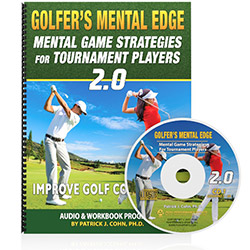Evaluate Your Golf Game To Improve Performance
Effectively evaluating your golf game requires balance. Some golfers look at their golf game and only see mistakes and failure.
These golfers have a bevy of ‘whys’ running through their heads: “Why do I always miss critical shots?” “Why can’t I beat so-and-so?” “Why can’t I lower my score?” All the negative questions swirling in your mind only serve to lower your confidence.
Conversely, if you refuse to objectively evaluate your golf performance and ignore weaker parts of your game, your growth as a golfer will stagnate. Many perfectionists fall into this category. Perfectionists are afraid to take chances to improve weaker components of their game.
Perfectionists prefer to stay in their cocoon rather than risk making mistakes. Perfectionists tend to be excessively anxious and also have shaky confidence.
Evaluating your golf game takes the willingness and strong-mindedness to admit that every golfer has strengths and weaknesses. Your weaknesses do not imply that you are a bad golfer. Weaknesses are signs that help you recognize what needs improvement not signs that you lack potential.
You must be willing to admit your weaknesses; notice the weak areas of your game without defining yourself by those areas. Weaknesses are limitations; they are areas that need improvement.
If you have the mental strength to honestly evaluate your game and take ownership of your golf game, then you are well on your way to achieving more in golf.
If you listen to some of the golfers who finished in the top four at the 2016 RBC Heritage, you will understand the importance of effectively and objectively evaluating your golf game after a round.
Branden Grace won the RBC Heritage by focusing on improving his putting which helped him secure his break-through victory and first PGA Tour title.
GRACE: “I’ve been playing well. I’ve missed a couple of cuts, but I’ve been playing great. Just the putter hasn’t been there. But a week like this it’s all about grinding and I’m glad to pull it off this week.”
Bryson DeChambeau finished tied for fourth and talked about the positive part of his game (putting) and what he needs to work on in the upcoming weeks.
DeCHAMBEAU: “I putted a lot better than the last few days. Unfortunately my driver was kind of giving out today. I’ll definitely work on that for next week. It was definitely fun to see some putts go in.”
Russell Knox was the runner-up and talked about how working on weaker aspects of his game has paid off.
KNOX: “Practice actually works. And I think I’m going to have to dedicate myself to do it more often. I was thrilled with the way I putted this week… I put in some time and actually figured out how to make a few.”
It may be difficult to objectively look at your level of play but, if you want to grow your golf abilities, you need to learn this skill.
Strategy for evaluating your golf game:
Since we can only focus on one area at a time, identify one skill (physical, mental, or technical) that you will commit to work on to improve your overall game.
Next, identify 3 specific steps you will take to improve this area, such as improving your touch on the greens for putting.
Commit to working… be patient… and watch your game improve!
Golfer’s Mental Edge

What’s the big sign that your mental game is the weak link in your golf game? When you can’t play consistently as well as when you play a practice or casual round–or your range game is way better than your game on the course. If you suffer from lack of focus, low self-confidence, poor composure or other mental game obstacles on the course, you can’t reach your true potential in golf.
The Golfer’s Mental Edge 2.0 Audio and Workbook program is ideal for any amateur, collegiate, junior, and tour professional golfer.
Golf coaches and instructors would also be wise to teach “The Golfer’s Mental Edge 2.0” principles to their players. This program is perfect for any golfer who wants to improve performance and consistency by managing their mind better on the course.

